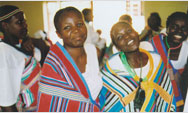Biotechnology
Successful Partnership Supports Field Trials of Bio-Engineered Crops in the Philippines
 |
|
Growing Papaya in Philippine hothouse
|
On March 10, 2008 U.S. Ambassador to the Philippines Kristie Kenney and USAID Deputy Director Elzadia Washington visited USAID-supported field trials of bioengineered crops at the University of The Philippines Los Banos (UPLB) and participated in an event recognizing the collaboration between the U.S. and Philippine governments in agri-biotechnology development.
Under the Agricultural Biotechnology Support Program (ABSP II), USAID has supported confined trials of insect-resistant eggplant and virus-resistant papaya, as a critical step in the process of product development and eventual commercial release of these improved varieties. UPLB officials anticipate commercial release sometime in 2009. The trials demonstrate the capacity of the Philippines’s public research sector to comply with the country’s regulatory biosafety system which USAID helped to strengthen through its Program for Biosafety Systems (PBS).
Eggplant and papaya are essential commodities for resource-poor farmers in the Philippines. Eggplant is now the Philippines’ top vegetable crop covering more than 20,000 hectares and producing about 179,000 ton/year, valued at two billion Philippine pesos. Papaya is one of the country’s most important fruit crops ranking sixth in the area planted (8,440 hectares) and fifth in volume (121,304 tons/year). It is grown mostly by small farmers and constitutes the main source of fiber and minerals in many rural communities. Papaya is also a significant source of Vitamin A.
The eggplant pest currently causes losses ranging from 50 to 73%. Supporting biotechnology is important because pest-resistant eggplant varieties are not available through breeding. Papaya ring-spot virus (PRSV) can also cause severe losses, ranging from 30 to 70 % and eventually lead to total crop failure.
Back to Top ^
|




